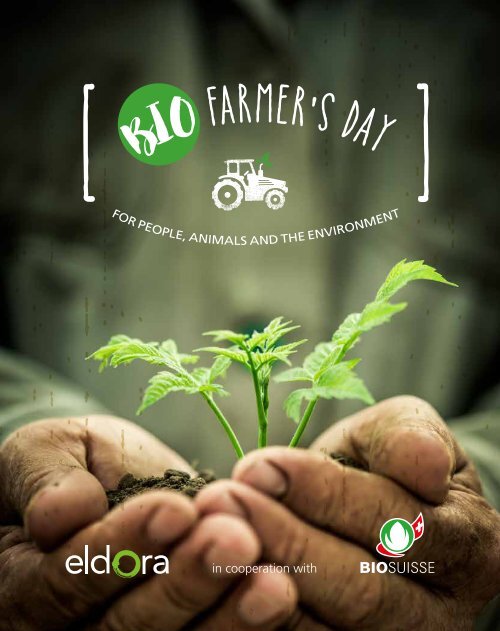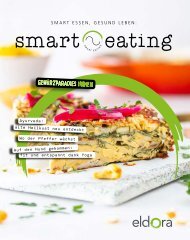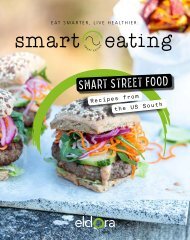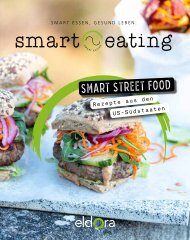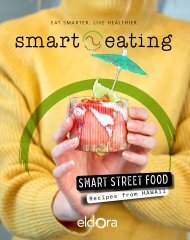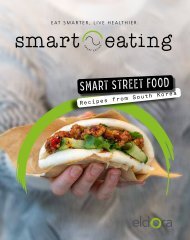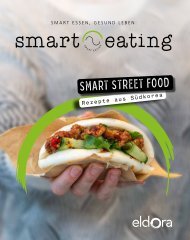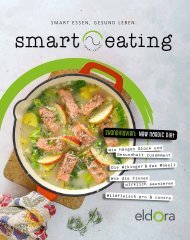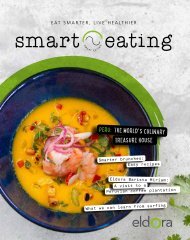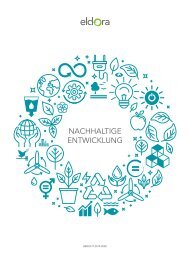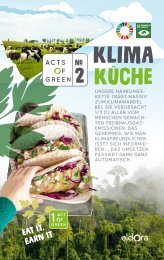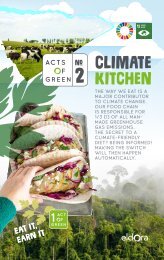Organic brochure EN
In cooperation with BIO SUISSE, we bring organic farmers to the fore and put their great, natural products in the spotlight.
In cooperation with BIO SUISSE, we bring organic farmers to the fore and put their great, natural products in the spotlight.
Create successful ePaper yourself
Turn your PDF publications into a flip-book with our unique Google optimized e-Paper software.
FOR PEOPLE, ANIMALS AND THE <strong>EN</strong>VIRONM<strong>EN</strong>T<br />
in cooperation with
Dear reader,<br />
Healthy eating starts with purchasing. And<br />
purchasing begins with the purchasing policy.<br />
Our policy is: fresh, seasonal and regional.<br />
Because as a Swiss catering company, we think<br />
it's important to support Swiss agriculture.<br />
That's why 100% of our organic food comes<br />
from Swiss producers.<br />
Even though the retail trade currently makes<br />
about 10 % of its turnover with organic<br />
products, restaurants still find it difficult to<br />
offer organic products because they are<br />
much more expensive.<br />
So if you don't want to scare your guests away<br />
with double or triple the price, you have to plan<br />
and calculate very carefully. Especially when it<br />
comes to organic meat, we work closely and<br />
directly with the producers and plan our menus<br />
accordingly on what they have to offer. This way<br />
both parties win: the producer can use and<br />
sell the whole animal (not just the good parts)<br />
and we get a good price for organic meat that<br />
we can pass on to our guests.<br />
In addition to the good price, our guests<br />
benefit from the best quality, more taste and<br />
the certainty of eating truly healthy and<br />
sustainable food. These are the values that<br />
unite Bio Suisse, the organic producers and<br />
the chefs at Eldora.<br />
Culilnary regards,<br />
Christian Moser<br />
Executive Chef Eldora Deutschschweiz<br />
2 3
<strong>Organic</strong> food<br />
out of<br />
love<br />
for our<br />
nature<br />
4 5
26<br />
BIO<br />
Farmer‘s Day<br />
32<br />
Content<br />
We love organic food<br />
8 <strong>Organic</strong>? Of course – BIO Farmer's Day<br />
10 From the organic farm to our plate<br />
12 Why "organic" has its price<br />
14 The organic labels<br />
16 We proudly present: Our organic farmers<br />
Ueli-Hof<br />
Rathgeb Bio<br />
Family Schori, organic eggs<br />
30 Biodiversity: more diversity for the bees<br />
36 A glance into the future<br />
16<br />
24<br />
7
<strong>Organic</strong>?<br />
Of course!<br />
You can find the term "organic"<br />
on many products. But what<br />
exactly does organic mean?<br />
The word "organic" has its origins in the old<br />
greek language standing for "something related<br />
to an organ or instrument". By the mid 20 th century<br />
people started to use it for produce that is<br />
"fed" with organic material and no fertiliser or<br />
pestizides are used. <strong>Organic</strong> farming therefore<br />
means a method of cultivation in which the<br />
natural processes in the life of plants, animals and<br />
humans are taken into account and protected.<br />
The soil is cultivated without chemical fertilisers<br />
and pesticides. The plants on the soil serve as<br />
food for the animals and their manure in turn as<br />
fertiliser for the plants. This creates a sustainable<br />
cycle.<br />
such as the Appenzell bearded partridge. Every<br />
organic farm also has a green area (flower meadows,<br />
hedges, biotopes) that is not tilled and<br />
creates additional habitat for various wild animal<br />
species. This makes it possible to discover animal<br />
species on organic farms that are almost impossible<br />
to find anywhere else.<br />
<strong>Organic</strong><br />
vegetables,<br />
fruits, grain<br />
<strong>Organic</strong> food and<br />
feed<br />
<strong>Organic</strong><br />
meat, eggs,<br />
milk<br />
animal welfare<br />
compost<br />
Natural fertiliser<br />
BIO FARMER'S DAY<br />
Quality, enjoyment, health<br />
and sustainability are important<br />
values in our purchasing.<br />
At Eldora, we take our responsibility<br />
towards our guests very<br />
seriously. That's why we have<br />
long-standing business relationships<br />
with our suppliers and<br />
partners.<br />
Eldora and Bio Suisse have been cooperating<br />
since 2018. Both Eldora and Bio Suisse want to<br />
support sustainability in Switzerland and promote<br />
the demand for organic food. In addition to the<br />
fact that an organic ingredient is on the menu in<br />
the Eldora restaurants at least once a week, the<br />
Bio Farmer's Day is held fiv e times a year.<br />
With the Bio Farmer's Day, we present organic<br />
farmers in more detail and thus put their great<br />
organic products in the spotlight for one day<br />
each. From crunchy organic vegetables to juicy<br />
organic meat and fresh organic eggs – where it<br />
says organic, it says pure nature. And you<br />
can taste it too.<br />
For a great diversity of species<br />
<strong>Organic</strong> farms promote biodiversity and thus<br />
rediscover "old" species of animals and plants,<br />
*graphic: Bio Suisse<br />
Fertile soil<br />
& Biodiversity<br />
8
3.<br />
From the farm<br />
to the plate<br />
BIO- AND SPECIES<br />
DIVERSITY<br />
Flower meadows, hedges or<br />
piles of branches: in an "imperfect"<br />
garden and courtyard,<br />
rare animal species also<br />
find nesting sites and habitats.<br />
More than half of the Swiss people<br />
buy organic products daily or several<br />
times a week. But why should one<br />
choose an organic product?<br />
An apple is always an apple,<br />
isn't it? Yes, but there is more<br />
good in organic products than<br />
meets the eye.<br />
PROCESSING<br />
<strong>Organic</strong> products contain only natural<br />
ingredients, i.e. no colourings or flavourings.<br />
And as natural as possible also means<br />
4.<br />
as few processing steps as necessary. For<br />
example, Bio Suisse orange juice must not<br />
be made from concentrate and organic<br />
milk must not be highly pasteurised. In<br />
addition: as much packaging as needed,<br />
as little as possible. Packaging must offer<br />
optimal product protection and keep the<br />
environmental impact low.<br />
1.<br />
EXERCISE AND ORGANIC FEED<br />
FOR THE ANIMALS<br />
Plenty of space and regular exer-<br />
2.<br />
NO ARTIFICIAL FERTILISER,<br />
NO SYNTHETIC CHEMICAL<br />
PESTICIDES<br />
No pesticides, no genetic engi-<br />
6.<br />
TRANSPAR<strong>EN</strong>CY AND TRACEABILITY<br />
Every organic product from Bio Suisse can<br />
be traced back to the farm.<br />
TRANSPORT<br />
5.<br />
cise are reflected in the health of<br />
neering – this protects the soil<br />
<strong>Organic</strong> and non-organic products may only be<br />
the animals and this in turn in good<br />
and promotes biodiversity.<br />
transported together if they are appropriately<br />
quality products. Animals also eat<br />
Only natural fertiliser such as<br />
packaged and each box is clearly labelled as<br />
organic feed – and that comes<br />
cow dung or compost is used.<br />
organic by the supplier. Air imports are prohibited<br />
mainly from their own farm, makes<br />
and imported products only come from<br />
sense, right?<br />
nearby countries.<br />
10 11
Why "organic"<br />
has its price<br />
Did you<br />
know that...?<br />
... in Switzerland, but also abroad, food is<br />
cheaper than ever before? Sad but true: Throwing<br />
away food almost doesn't hurt us financially in Switzerland.<br />
Statistics show that the weighted share of<br />
food waste in households in Switzerland is around 38%.<br />
That is one thing.<br />
However, if one were to calculate the true costs of<br />
food for humans and the environment (including consequential<br />
damage from nitrogen, greenhouse gas<br />
emissions and energy consumption), food<br />
would have to be sold at a much<br />
higher price.<br />
As with many great things, the<br />
same applies to "organic": good<br />
things take time. An organic<br />
farmer takes a lot of time so that<br />
he can show more consideration<br />
for animals and nature.<br />
In crop cultivation, fertiliser is used only sparingly<br />
and synthetic chemical pesticides are not used<br />
at all. This environmentally friendly cultivation<br />
method requires more work and often results<br />
in less abundant harvests: yields are reduced by<br />
20 to 30%.<br />
Species-appropriate animal husbandry needs<br />
a lot of space as well as a lot of time. <strong>Organic</strong><br />
feed is an additional cost factor that should not<br />
be underestimated.<br />
Living soil<br />
The condition of the soil and the maintenance<br />
of its fertility are of central importance to the<br />
organic farmer. At regular intervals, an organic<br />
farm must therefore reserve part of its cultivated<br />
area for the cultivation of plants that help the<br />
soil to recover and accumulate nitrogen for<br />
future cultivation phases. This land is therefore<br />
not available for the cultivation of vegetables<br />
and fruits.<br />
In addition, around 7% of the agricultural land<br />
on "Bio Suisse" farms is permanently reserved<br />
to generate more biodiversity.<br />
12 13
<strong>Organic</strong> labels<br />
Conscious shoppers like to use<br />
labels as a guide. Regional,<br />
seasonal, sustainable - but it<br />
is often hard to keep track<br />
of the label jungle. How does<br />
"Bio Suisse" actually differ<br />
from "EU organic certificate"?<br />
Is "organic" not the same as<br />
"organic"?<br />
Here we briefly introduce the<br />
most important labels.<br />
The "Bio Swiss" bud is one of the strictest<br />
organic labels in the world. Domestic<br />
products are highlighted by the Swiss<br />
cross in the label. In Switzerland, farmers<br />
must produce organically on a whole-farm basis<br />
if they want to fulfill the Bio Suisse label. This<br />
means that a farmer cannot simply "grow only"<br />
organic potatoes, but must produce organically in<br />
every single area of the farm. The label achieves<br />
above-average results in all assessment areas<br />
and product ranges because it sets high standards<br />
for the environment as well as in the areas<br />
of animal welfare and social issues.<br />
The Bud without the Swiss flag stands<br />
for foods in which more than 10% of the<br />
raw materials originate from foreign organic<br />
production. These raw materials produced<br />
abroad are subject to equivalent guidelines<br />
and controls as "Bio Swiss" bud products.<br />
*The following labels are based in whole or in part<br />
on the "Bio Swiss" guidelines: Coop Naturaplan,<br />
Migros Bio Schweiz (unprocessed products), Manor<br />
bio natur plus Schweiz, KAG Freiland, Natura Beef<br />
Bio Schweiz, Weide Beef Bio Schweiz, Fidelio.<br />
«Demeter» is the oldest organic label.<br />
In addition to the "Bio Swiss" standards,<br />
Demeter farms must meet additional<br />
requirements. Demeter farmers use<br />
the energies from nature for soil improvement<br />
and quality enhancement (e.g. the positive<br />
effect from the changing constellations of sun,<br />
moon & planets). In contrast to organic farms,<br />
animal husbandry is mandatory for Demeter.<br />
This is the only way to create a cycle between<br />
animals and nature. With natural substances it is<br />
ensured that the soil gets back the nutrients<br />
that have been extracted from it. In addition,<br />
fewer additives and processing steps are<br />
permitted during processing than for other<br />
products.<br />
The euro leaf on a green background is<br />
the "EU organic logo". The hexagonal<br />
mark for German organic products<br />
was replaced by the EU organic<br />
seal in 2010 and no longer has an independent<br />
message. The "EU-Bio-Logo" scores lower than<br />
"Bio Swiss" in the areas of irrigation, biodiversity,<br />
climate and social issues because there are few<br />
or no requirements. For example, it is allowed to<br />
run only a single area of the farm organically.<br />
14 15
We proudly present:<br />
Our organic<br />
partners<br />
We know our producers.<br />
We love the stories about the<br />
products, the people who<br />
make them and the places<br />
where they come from.<br />
After all, high-quality gastronomy is only possible<br />
if we have fresh, first-choice products available<br />
every day. For this to happen, there must<br />
be trust on both sides. Eldora also takes care to<br />
select the best local suppliers who are close to<br />
each restaurant.<br />
Did you<br />
know that...?<br />
... only farms that manage<br />
the whole farm organically are<br />
allowed to carry the Bio Suisse<br />
Logo? The conversion of a<br />
conventional farm to an<br />
organic farm takes<br />
about two years.<br />
Eldora does not make short-term promises, but<br />
creates long-term, sustainable and fair partner-<br />
ships. Business management thinking is also<br />
part of a flourishing business relationship: it is<br />
our job to successfully manage our customers'<br />
gastronomy. With our passion, pursuit of excellence<br />
and, last but not least, our enthusiasm for<br />
innovation, we not only have good ideas, but<br />
also make sure that the implementation is right.<br />
Eldora works with selected<br />
organic partners. They are<br />
at home in the prettiest<br />
places of Switzerland. In<br />
cooperation with Bio Suisse, we put some of<br />
them in the spotlight – including their great,<br />
natural products.<br />
16 17
Did you<br />
know that...?<br />
Ueli-Hof<br />
With organic farming, Ueli-Hof<br />
in Ebikon, Lucerne, ensures a<br />
natural coexistence of humans<br />
and animals in an intact natural<br />
environment. Because when<br />
the animals are happy, you see<br />
it on the field – and ultimately<br />
taste it on your plate.<br />
Under strict organic and ethical guidelines,<br />
Ueli-Hof is deeply committed to conscious meat<br />
consumption that is in harmony with people,<br />
animals and the environment. The result of<br />
their commitment are organic products of the<br />
highest quality for responsible meat enjoyment.<br />
What began many years ago as<br />
a farm shop led to the founding<br />
of Ueli-Hof AG in 2002. From<br />
then on, Walter and Ueli Unternährer<br />
implemented their vision of ensuring a meat<br />
consumption that is in harmony with people,<br />
animals and the environment. Today, several<br />
organic farms in Central Switzerland and neighbouring<br />
cantons are committed to this vision<br />
on a daily basis as the Ueli-Hof producer<br />
association. The animals are slaughtered and<br />
processed in the farm's own butchery in<br />
Ebikon.<br />
«<br />
Meat is a side dish and<br />
not everything else.<br />
Ueli Unternährer<br />
...organic meat is seasonal? The reason<br />
for this is that organic farms are often<br />
located in the mountains. During the<br />
summer, the animals are on the alps and<br />
graze on the lush summer grasslands.<br />
That is why organic beef, veal and<br />
lamb are scarcer in the summer<br />
months than in other<br />
months.<br />
18 19
Minced beef with pasta<br />
with meat from Ueli-hof<br />
Serves 4 people<br />
The Ueli-Hof butchery<br />
The exclusive in-house slaughtering<br />
in Ebikon guarantees an<br />
extra ordinary quality. Because<br />
"organic" does not simply end<br />
after the species-appropriate<br />
husbandry on the farm.<br />
Slaughtering in their own butchery guarantees<br />
respectful treatment of the animal not only on<br />
the farm, but also on its final journey. Often the<br />
farmers accompany their animals until the end.<br />
Ueli-Hof's meat specialities are the result of a<br />
self-conception that is unique in Switzerland.<br />
Here, everything is taken into one's own hands:<br />
From species-appropriate animal husbandry<br />
and in-house slaughtering to the processing<br />
and sale of the meat products in the company's<br />
own shops.<br />
A good butcher who respects the animals and<br />
takes his time is very important. This is necessary<br />
for careful meat processing and guarantees that<br />
the quality of the meat is high and sustainable.<br />
Moreover, the whole animal is processed "from<br />
nose to tail" – from noble cuts to so-called<br />
"second cuts" to organic dog food.<br />
Eldora AG has gained a long-term partner in<br />
the Ueli-Hof, in whose butchery training and<br />
further education courses for Eldora employees<br />
also take place.<br />
www.uelihof.ch<br />
MINCED BEEF<br />
500 g Minced beef from Ueli-Hof<br />
1 tbsp Butter (to fry)<br />
1 Onion, chopped<br />
1 Clove of garlic, chopped<br />
3–4 Marjoram and thyme twigs<br />
1 tbsp Tomato puree<br />
1½ tbsp Cornflour<br />
1 dl Red wine<br />
2 dl Bouillon<br />
Salt, pepper and paprika<br />
PASTA<br />
400 g Swiss Hörnli Pasta<br />
100 g Grated Alpine cheese<br />
APPLE SAUCE<br />
1,5 dl Water<br />
2 tbsp Lemon juice<br />
2 tbsp Sugar<br />
½ tsp Cinnamon<br />
800 g Apples , cut in slices<br />
PREPARATION<br />
Simmer all the ingredients for the apple sauce<br />
until soft and purée. Brown the meat in butter.<br />
Reduce the heat and fry the onion, garlic, herbs<br />
and tomato puree. Mix in the cornflour and<br />
deglaze with red wine and stock. Season the<br />
sauce to taste and simmer, covered, for about<br />
15 minutes. Cook the pasta in salted water until<br />
al dente and drain. Divide the applesauce into<br />
small bowls. Arrange the pasta, minced meat<br />
and cheese on plates.<br />
20<br />
21
Rathgeb Bio has various cultivation areas in<br />
Unterstammheim and a greenhouse in Tägerwilen,<br />
TG. The farm is one of the leading<br />
Swiss organic companies. Find more here:<br />
www.rathgeb.bio<br />
Did you<br />
know that...?<br />
... Cucumbers absorb pesticides<br />
particularly strongly? That's why<br />
you should always go for organic<br />
cucumbers. Swiss cucumbers<br />
are in season from May to<br />
October.<br />
Rathgeb Bio<br />
Can organic also work on a large<br />
farm? Yes, because organic has<br />
basically nothing to do with the<br />
size of the farm.<br />
Many people associate "organic" with a small<br />
farm with grazing cows, flowering meadows,<br />
clucking chickens in the yard and a lot of<br />
manual labour. This conception not wrong, but<br />
the demand for organic products is steadily<br />
increasing. In order to be able to offer enough,<br />
cultivation, harvesting, storage, washing, pack-<br />
aging and transport are now more efficient.<br />
That is why there are also large-scale farms like<br />
Rathgeb Bio in Switzerland. Since 1994, they<br />
have been producing over 60 varieties of fresh<br />
organic vegetables: from carrots to potatoes,<br />
spinach, tomatoes and cucumbers. And large at<br />
Rathgeb are not only the planted fields, but also<br />
the many compensatory areas, which provide<br />
an important habitat for insects, flowers and<br />
small animals: in other words, biodiversity par<br />
excellence...<br />
Crooked cucumbers or twisted<br />
carrots: Nature has a mind of its<br />
own. That is why not every carrot<br />
looks like the other.<br />
Too small, too big, too crooked: in Switzerland,<br />
almost 30% of the fruit and vegetables grown<br />
are thrown away because they do not meet<br />
the commercial standard. Even if this means a<br />
little more effort for us in the kitchen, we want<br />
to save fruit and vegetables with so-called<br />
"blemishes" in our Eldora restaurants. Because a<br />
crooked cucumber tastes just as delicious as its<br />
straight colleagues – if not even a little better...<br />
22 23
Did you<br />
know that...?<br />
...the potato is actually quite low<br />
in calories compared to pasta and<br />
rice? Provided, of course, that<br />
you don't deep-fry them...<br />
Potato: 70 kcal / 100 g<br />
Pasta: 140 kcal<br />
Rice 120 kcal<br />
<strong>Organic</strong> Swiss meatloaf<br />
With wild garlic, potato mash and honey glazed carrots<br />
Serves 4 people<br />
The lemon of the north<br />
The potato has it all: in addition to vitamin B6,<br />
potassium and magnesium, it contains a lot of<br />
vitamin C – more than in an average apple.<br />
That is why our favourite tuber is also called the "lemon of the north".<br />
So the prejudice that the potato is just a filling side dish without added<br />
value is wrong. And what about its reputation as a fattening food?<br />
The fat content of the potato is only 0.1 %. So if you pay attention to<br />
low-fat preparation (e.g. salted potatoes or jacket potato), the potato can<br />
score as a healthy source of energy. Because of their high starch content,<br />
potatoes are also ideal for filling up.<br />
variety of potatoes<br />
INGREDI<strong>EN</strong>TS<br />
1 kg <strong>Organic</strong> Swiss meatloaf,<br />
e.g. from Ueli-Hof<br />
800 g <strong>Organic</strong> potatoes, e.g. Bintje, Désirée<br />
40 g Butter<br />
1 bunch Wild garlic (or other seasonal herbs)<br />
Salt, pepper, nutmeg<br />
350 g <strong>Organic</strong> carrots<br />
2 tbsp Olive oil<br />
1 tbsp Honey<br />
1 tbsp Orange juice<br />
Salt, pepper<br />
PREPARATION<br />
Bake the meat loaf in the bottom half of the<br />
oven preheated to 160°C for 45–55 minutes.<br />
bake.<br />
potatoes steam out. Add butter, wild garlic and<br />
a little water if needed. Mash the potatoes with<br />
a potato masher or a fork and season. Tip: If you<br />
want the mashed potatoes especially green, mix<br />
the wild garlic with a little olive oil beforehand.<br />
Wash the carrots and chop as desired. Mix the<br />
remaining ingredients to make a marinade, rub<br />
the carrots with the marinade and leave to<br />
marinate for a while. Place the carrots on a<br />
baking tray lined with baking paper. Bake for<br />
30 minutes at 160°C with the meat loaf. Remove<br />
the meat loaf from the oven and let it rest<br />
for a short time. During this time, increase the<br />
heat in the oven to 200°C and bake the carrots<br />
on the highest setting for 5 minutes.<br />
For the mash, cook the peeled potatoes uncovered<br />
in boiling salted water for approx. 20 minutes<br />
until soft. Drain the water and let the<br />
Serve it with a fried egg, grainy mustard or<br />
mustard sauce.<br />
BINTJE<br />
DÉSIRÉE<br />
GOURMANDINE<br />
LAURA<br />
NICOLA<br />
floury, light yellow,<br />
floury,<br />
firm cooking,<br />
rather floury, deep<br />
firm cooking,<br />
versatile, very<br />
light yellow, red<br />
yellow, for potato<br />
yellow, versatile,<br />
fair to deep yellow,<br />
good storage<br />
skin, storable<br />
salad and boiled<br />
good storage<br />
fine, moist<br />
qualities<br />
potatoes<br />
qualities<br />
24 25
<strong>Organic</strong> beef burger<br />
with cole slaw and caramelised onions<br />
Serves 4 people<br />
BURGER<br />
4 <strong>Organic</strong> burger buns<br />
4 <strong>Organic</strong> beef patty,<br />
e.g. from Ueli-Hof<br />
40 g <strong>Organic</strong> salad<br />
e.g. Lettuce, ice berg, arugula<br />
<strong>Organic</strong> ketchup<br />
CARAMELISED ONIONS<br />
2 large organic onions<br />
1 tbsp Butter<br />
1 tsp Olive oil<br />
50 g Brown sugar<br />
1 dl Red wine vinegar<br />
1 Bay leaf<br />
COLE SLAW<br />
¼ <strong>Organic</strong> white cabbage,<br />
¼ <strong>Organic</strong> red cabbage<br />
2 <strong>Organic</strong> carrots<br />
all above finely chopped<br />
80 g <strong>Organic</strong> mayonnaise<br />
Salt, pepper, lemon juice<br />
PREPARATION<br />
Peel the onions and cut them into 2 cm thick<br />
slices. In a non-stick frying pan, melt the<br />
butter, olive oil and raw sugar over a low heat.<br />
Add the onions and fry them for 5 minutes.<br />
Add the red wine vinegar and bay leaf, cook<br />
over medium heat, stirring occasionally, until<br />
soft, about 20 minutes. Remove the bay leaf.<br />
For the cole slaw, marinate the vegetables<br />
with salt, pepper and lemon juice. Leave to<br />
marinate for 10 minutes, pour off excess liquid.<br />
Mix with mayonnaise and season to taste.<br />
Tip: If you like it a little lighter, you can use<br />
yoghurt instead of mayonnaise.<br />
Sear or grill the burger patties on both sides<br />
for approx. 2 minutes (our recommendation:<br />
medium). Toast the buns and spread with a little<br />
ketchup.<br />
To serve, place some lettuce, cole slaw, a burger<br />
patty and some of the caramelised onions on<br />
each bun base, top with a lid.<br />
As a side we chose the full moon potato<br />
chips.<br />
26<br />
27
Even chickens<br />
love organic<br />
Tiramisù with organic eggs<br />
INGREDI<strong>EN</strong>TS serves 4 people<br />
Switzerland is an "egg nation".<br />
We eat around one billion eggs<br />
per year – and around 30% of<br />
these are organic.<br />
Almost a third – that's a record, because no<br />
other organic product is sold more often. Swiss<br />
organic chickens have a good life: The animals<br />
move around stress-free in the spacious freerange<br />
barns and can live out their typical social<br />
behaviour.<br />
50 g Sugar<br />
2 Fresh organic egg, separated<br />
1 Orange (zest)<br />
250 g Mascarpone<br />
1 pinch Salt<br />
1 tbsp Sugar<br />
250 g Heavy cream<br />
2 dl <strong>Organic</strong> espresso<br />
5 tbsp Amaretto<br />
2 tbsp Grand Marnier<br />
150 g Ladyfingers<br />
1 EL <strong>Organic</strong> cocoa powder<br />
PREPARATION<br />
28<br />
Did you<br />
knot that...?<br />
... the egg yolk contains<br />
more protein than<br />
the egg white?<br />
This husbandry method is reflected in the<br />
quality of the eggs: for example, organic eggs<br />
contain more vitamin E and carotenoids than<br />
eggs from barns. Since no paprika is added to<br />
organic chicken feed, organic eggs are often<br />
lighter in colour than conventional eggs. The<br />
colour of the yolk has no influence on taste.<br />
The Schori family runs an<br />
idyllic chicken farm in Muolen<br />
near Romanshorn. There,<br />
2000 hens cluck contentedly<br />
in the coop and on the grass. Nicole and<br />
Hansjörg Schori have been farming organic<br />
for 20 years.<br />
Whip the cream until stiff and chill. Stir the<br />
sugar and egg yolks in a bowl until the mixture<br />
is pale. Stir the grated orange zest into the mixture<br />
with the mascarpone. Beat the egg whites<br />
with the salt until stiff. Add the sugar, continue<br />
beating briefly until the egg whites are glossy,<br />
carefully fold into the mascarpone mixture. Mix<br />
in the whipped cream and chill.<br />
Mix the espresso, Amaretto and Grand Marnier.<br />
Cover the base of a container with a few ladyfingers.<br />
Drizzle half of the liquid over the biscuits,<br />
then spread half of the mascarpone cream on<br />
top, dip the remaining biscuits in the liquid,<br />
place on top, cover with remaining cream, cover<br />
and chill for at least 2 hours.<br />
Dust it with cocoa powder<br />
29
Biodiversity -<br />
more for everyone<br />
No one lives for himself alone.<br />
From cows to humans to tiny insects:<br />
everything is interconnected and<br />
interdependent. Biodiversity – the<br />
variety of habitats, species and<br />
genes - includes the whole world.<br />
Biodiversity is indispensable for our quality of<br />
life. We owe it our food, clean water, clean<br />
air, clothing, energy, building materials and<br />
also habitable space.<br />
A short-cropped English lawn may look wellkept<br />
at first glance, but a garden that is too<br />
perfect is not conducive to nature and especially<br />
biodiversity. In recent times, natural meadows<br />
have become increasingly scarce in our<br />
surroundings. Above all, the intensification of<br />
agriculture and the overbuilding of green<br />
spaces have led to the disappearance of<br />
flower meadows in many places – and with<br />
them numerous animal and plant species that<br />
depend on this habitat.<br />
<strong>Organic</strong> farming promotes natural life processes<br />
and supports the interactions between ecosystems,<br />
species and genes. By not using<br />
herbicides and pesticides and by maintaining<br />
a diverse cover of arable land, organic farmers<br />
preserve a living and healthy soil. You can<br />
smell and feel this when you hold the soil in<br />
your hands. Healthy soil smells of life. Healthy<br />
soil is a prerequisite for healthy plants,<br />
healthy animals and consequently healthy food.<br />
«Mission B»<br />
The joint project of SRF, RSI, RTR & RTS<br />
aims to sustainably promote biodiversity in<br />
Switzerland. A plan B for nature, because every<br />
second 0.7m2 of green space is built up in<br />
Switzerland...<br />
Create new habitats for native flowers,<br />
insects, birds and lizards! This can be a flower<br />
pot on the balcony, a corner in the garden<br />
that you leave to nature, a flower meadow<br />
instead of an English lawn or native shrubs<br />
instead of thuja and cherry laurel.<br />
Find more here:<br />
www.missionb.ch<br />
30 31
When the bees are<br />
with the flowers...<br />
... it is not just an love affair but a<br />
fruitful creation of new life. Because<br />
bees have a far greater task than<br />
providing us with honey.<br />
Albert Einstein is said to have stated in 1949:<br />
"Once the bee disappears from the earth, man<br />
will have only four years to live. No more bees,<br />
no more pollination, no more plants, no more<br />
animals, no more people."<br />
There are 20,250 bee species worldwide, but<br />
only nine of them are honey bees. In Switzerland,<br />
around 600 species are native, such as the<br />
furry bee, mason bee and various bumblebee<br />
species. As a pollinator insect, the honey bee in<br />
particular makes a huge contribution to our<br />
ecosystem. Bees need the nectar of plants as<br />
food to survive – plants need a pollinator to<br />
spread their pollen and thus reproduce.<br />
Animal welfare for the tiny ones<br />
It is impossible to imagine human life without<br />
the bee, but the population has been in danger<br />
for years due to the widespread death of bee<br />
colonies. So when it comes to animal protection<br />
and welfare, we should not forget the tiny<br />
ones. This also includes butterflies, earthworms<br />
and the often annoying house flies – they all<br />
have their task and right to exist in the cycle of<br />
nature.<br />
The honey bee is the third most important farm animal<br />
after cattle & pigs.<br />
Their pollination services ensure the diversity<br />
of food as we know and appreciate it.<br />
• Out of 100 edible plant species, 71 are<br />
pollinated by bees.<br />
• Fruits and vegetables pollinated by bees<br />
grow larger, have fewer deformities and<br />
simply taste better.<br />
• For stone and pome fruits, insect pollination<br />
increases fruit yield by 40 percent.<br />
• Crops such as cocoa, vanilla and passion fruit<br />
are 100 per cent dependent on pollination<br />
by bees.<br />
Due to the death of honey bees in recent years<br />
(triggered by parasites, stress factors and pesticides)<br />
and a decline in active beekeepers, safe<br />
pollination is increasingly at risk.<br />
Wild bees such as the mason bee have the<br />
greatest potential to support honey bees in<br />
their important work. And it even has the<br />
potential to become your next "pet"...<br />
32<br />
33
Mi casa es su casa:<br />
"Board and lodging" for bees and co.<br />
In order for bees and co. to settle<br />
down and feel at "home", they<br />
need not only a nice place to<br />
stay, but also the right food.<br />
It does not matter whether it's<br />
in the city or the countryside:<br />
The main thing is the food is not<br />
more than 300 metres from the<br />
nesting site. So it's best to plant<br />
the pretty "food" yourself.<br />
With simple nesting aids for the<br />
peaceful wild bees, each of us<br />
can make a small contribution<br />
against bee mortality.<br />
Different species of wild bees have different<br />
requirements for their homes. Even a balcony<br />
offers enough space to provide a selection of<br />
nesting opportunities.<br />
Bellflowers: Not only is there delicious pollen<br />
here, but bees also like to use the large flowers<br />
for a nap.<br />
Deadwood: Pieces of branches and trunks at<br />
least the thickness of the forearm can be<br />
offered standing on the balcony.<br />
Sand: Fill small boxes compact and piled up<br />
with sand containing light clay.<br />
Pith stalks: Pith stalks that have become dry<br />
(e.g. from elderberry) can easily be tied to the<br />
railing or stuck into herb pots. Important:<br />
Attach vertically!<br />
Wild bee hotel:<br />
Caution, many of the<br />
bee hotels available in<br />
supermarkets and co.<br />
are unfortunately completely<br />
unsuitable as<br />
nesting aids. In the<br />
worst case, the hotels<br />
become a death trap for<br />
the bees due to splinters<br />
from unclean holes,<br />
moisture or fungal infestation.<br />
Even pine cones or wood wool are of<br />
no use to wild bees – on the contrary, because<br />
predators can nestle in them. The wild bee<br />
house from Wildbiene+Partner came out best<br />
of nine hotels in the Kassensturz test. You can<br />
even become a wild bee sponsor and receive<br />
a BeeHome with a starting population of<br />
25 mason bee cocoons. If you send in the<br />
BeeHome for wild bee care in the fall, the<br />
animals will be sent to orchards next spring and<br />
help ensure pollination in agriculture. More<br />
information at wildbieneundpartner.ch<br />
Variety: Pollen and nectar are the bees' bread<br />
and butter. But not all flowers offer both. So the<br />
more diverse the range of plants, the better!<br />
Regular meals: By planting both early-, mid-,<br />
and late-blooming species, you ensure that bees<br />
find food throughout the year.<br />
Early bloomers: crocuses and tulips<br />
Mid-flowering species: fruit trees<br />
and blackberries<br />
Late bloomers: ivy and autumn aster<br />
Wildflower mixtures can also be sown in larger tubs<br />
or balcony boxes. A pot of lavender will fit on<br />
any window ledge.<br />
All that is fragrant is not gold.<br />
roses, geraniums, forsythia, cultivated dahlias<br />
or garden chrysanthemums are decorative and<br />
smell good, but provide little or no food for<br />
bees. Look for so-called "unfilled" flowers.<br />
Good bee food (pollen & nectar) can be<br />
found in the flowers of these plants, for<br />
example:<br />
Herbst: wild garlic, sage, thyme, rosemary,<br />
chives, lavender, oregano, basil,<br />
Fruits: raspberry, blueberry, currant, strawberry,<br />
physalis<br />
Vegetables: beans, hot peppers, tomatoes,<br />
cucumber, aubergine, courgette<br />
Ornamental flowers: cornflower, marigold,<br />
nasturtium, verbena, bellflower, daisies,<br />
34 35<br />
sunflowers
A glance into the<br />
Future<br />
Worldwide, only about 1.5% of<br />
agricultural land is cultivated<br />
organically. Quite little, if you<br />
think about it... Certainly, with<br />
conventional farming you have<br />
more yield. But is this also the<br />
better solution for the supply of<br />
all people in the long term?<br />
In Switzerland, organic food has been in vogue<br />
for 20 years, and we are the frontrunners in<br />
terms of annual per capita consumption of<br />
organic food. The steadily growing organic<br />
market in this country turns over an impressive<br />
2.3 billion Swiss francs per year.<br />
On an organic farm, less is produced on a larger<br />
area of land and over a longer period of time. In<br />
addition, production costs more. This contrasts<br />
with conventional farms, which are designed to<br />
be profitable and therefore produce more in<br />
less time and on less land at a lower cost.<br />
The changing climate<br />
The strong connection with nature and the<br />
environment makes the entire agricultural<br />
sector feel the effects of climate change<br />
strongly. Even small changes in climate can have<br />
big effects. A healthy organic soil, which is not<br />
depleted with nitrogen or chemicals, can per se<br />
store more water and absorb it faster. In view of<br />
climate change, as a result of which extreme<br />
weather events, droughts and floods will<br />
increase, this is definitely an advantage for the<br />
future.<br />
The journey is the destination<br />
<strong>Organic</strong> farming is an important part of the<br />
journey towards sustainable food. To make a<br />
difference in the long run, we unquestionably<br />
need more sustainable measures and everyone's<br />
commitment: If we all buy food regionally and<br />
seasonally, reduce food waste, eat less meat<br />
and generally handle our resources in a more<br />
sustainable way, we will make a big step towards<br />
the right direction.<br />
36 37
All organic<br />
menus from organic<br />
farming are labelled<br />
with this pictogram<br />
BIO<br />
Farmer‘s Day<br />
38 Sources: Bio Suisse, Ueli-Hof, Wildbiene+Partner, FiBL Schweiz, bafu<br />
39
Eldora AG<br />
Gebäude A1 M.O.V.E.<br />
Bändliweg 20<br />
8048 Zürich<br />
Tel. +41 (0) 43 255 20 50<br />
info.zuerich@eldora.ch<br />
de.eldora.ch


